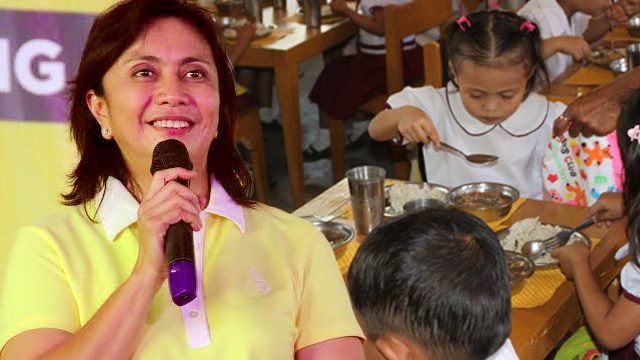SUMMARY
This is AI generated summarization, which may have errors. For context, always refer to the full article.

MANILA, Philippines – Will the Philippines be hunger-free in 2016 and beyond?
In August 2015, Camarines Sur 3rd District Representative and vice presidential bet Leni Robredo filed House Bill 606 or the National Food Security Act.
The bill proposes a national feeding program partly sourced from small-scale producers. This way, children are properly fed and at the same time, the poorest fishermen, farmers, and agricultural workers are ensured of regular livelihood.
Five months later, the House Committee on Food Security finally conducted an initial deliberation on Robredo’s bill.
“I believe hunger is one of the most pressing issues our country is facing today,” Robredo said on Tuesday, January 19. In crafting her bill, she said they took into account Brazil’s Zero Hunger program.
The bill comes at no greater time as the Philippines continues to struggle with hunger and malnutrition, among both young and old.
In 2015, 35% of Filipinos considered themselves food-poor, the latest Social Weather Stations (SWS) survey revealed.
Malnutrition starts as early as infancy and its effects can last into adulthood. In the Philippines, malnutrition figures have remained virtually unchanged in the past 10 years.
Feeding, livelihood programs
At present, the Department of Education (DepEd) conducts school-based feeding programs for undernourished elementary students. Meanwhile, preschoolers are covered by the Department of Social Welfare and Development (DSWD). (READ: Feeding programs for Pinoy kids)
Robredo’s bill aims to reduce hunger and malnutrition by expanding existing programs to include more children. It has the following components:
- National Feeding Program: Covers children ages 0 to 13.
- Infant Feeding Program: Covers infants ages 0 to 1. The Department of Health, through barangay health workers, will distribute food packets among targeted infants.
- Supplementary Feeding Program: Covers children ages 2 to 5. The DSWD shall provide nutritious meals to those in supervised neighborhood play areas and daycare centers.
- Elementary Feeding School Program: Covers preschoolers up to children in 4th grade. The DepEd shall ensure these children receive “proper meals during school hours.”
To identify beneficiaries, the Philippine Statistics Authority, DOH, and DSWD shall create a “national hunger targeting system” documenting those with the “least access to proper nutrition.”
The DOH and the National Nutrition Council, meanwhile, suggested expanding the program to cover those up to 18 years old “to ensure high school retention.”
“That’s what we also want,” Robredo replied. Partner government agencies, however, requested to first put a bar at 4th grade to see if the program will be sustainable, she explained.
The bill also proposes to get at least 30% of the national feeding program’s supplies from small-scale producers – the poorest and landless farmers in the country, said Robredo.
The Department of Agriculture (DA) shall then document and provide technical support to these producers.
There is also a “need to integrate nutrition education,” the Food and Nutrition Research Institute of the Department of Science and Technology recommended during the deliberation.
Food Council
Aside from the feeding programs, Robredo’s bill proposes to create a “Food Council” which will be on top of all food security matters.
It will be an attached and independent agency to the Office of the President. Its chairperson is to be assigned by the President and should have sufficient experience working in food security.
The council will consist of representatives from relevant civil society organizations, small-scale producers, and government agencies.
‘No need’
While most government agencies supported Robredo’s bill, the Department of Finance (DOF) stood as the odd one out.
“We are not supportive of the bill,” the DOF’s position paper read.
Why? There are existing offices and programs already addressing hunger, livelihood, and feeding, the DOF argued, adding that there might be “duplication” of efforts.
Not enough?
Although Robredo’s bill bears “national food security” in its title, its focus is mainly on feeding programs, observed Fernando Hicap of the Anakpawis party-list.
But the question is whether feeding programs are enough to cure the Philippines of its massive hunger problem, some advocates say.
Hicap suggested digging deeper into the root causes of food insecurity, such as poverty, poor agriculture, land tenure, low salaries, and contractualization.
In response, Robredo said in Filipino, “If it’s all feeding, malnutrition will not end. That’s why we also need to fight poverty…. I’d like to refute that this is only [about] feeding, it’s also about poverty.” – Rappler.com
Add a comment
How does this make you feel?
There are no comments yet. Add your comment to start the conversation.